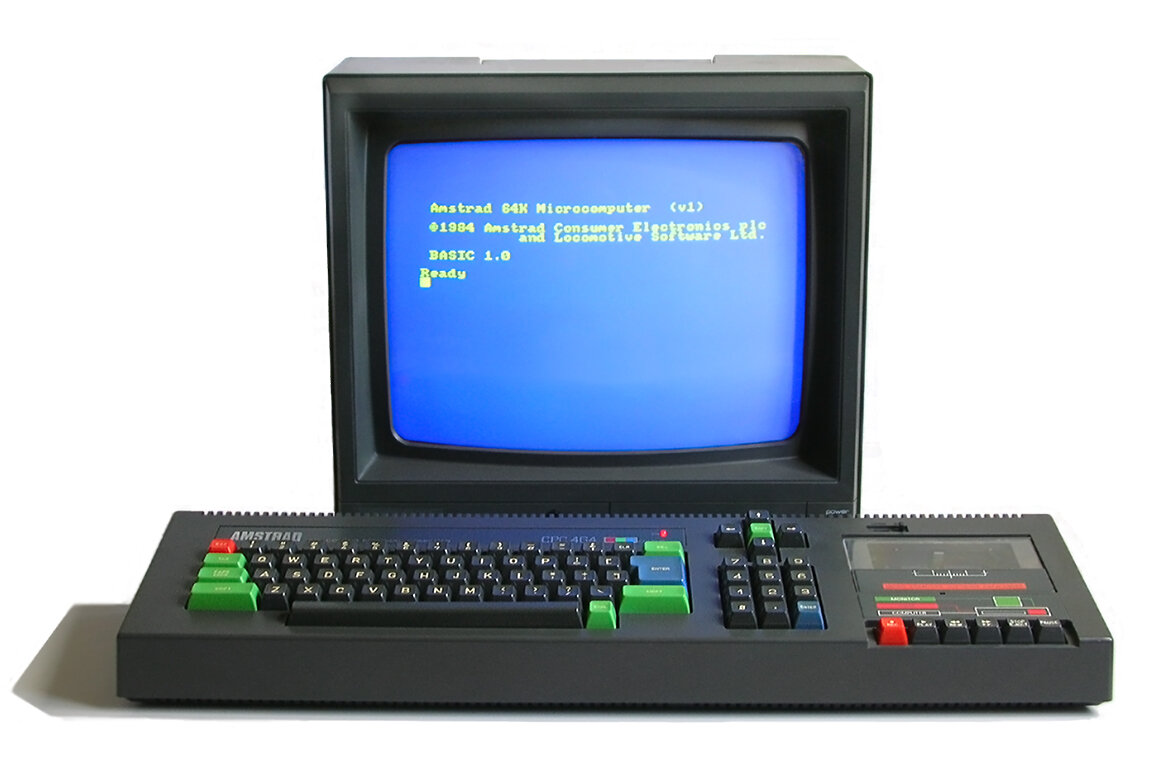The story of my podcast jingle properly starts in childhood.
I had an Amstrad CPC464. This was a UK computer of the 1980s.
Amstrad CPC 464, CC Bill Bertram via wiki
To load a game - and the 1980s childhood game that comes to mind most was the Dizzy series about an egghead character who jump/walks around platforms - took up to 20 minutes of loading a tape into the computer.
The computer came with a language, BASIC and beginner BASIC was taught at my school (via BBC Micro) and magazines provided some tutorials. There was no WWW or internet. You could and did code in BASIC which is a beginner level of computer science but certainly enough to spark interest in a child.
My friend Alex was around. Later Alex is the best man at my wedding, but for now we are children. I show him I have coded a drawing of a square and a triangle in a machine language that is not BASIC. I think it might have been C or possibly Turbo Pascal, some form of Assembly language. Coding didn’t really catch fire in my mind, so I’m unsurprised I have forgotten exactly.
Alex was impressed. Much more impressed that I was expecting. I believe it may have been due to the speed of the drawing which was seemingly so fast as to look almost instant.
In my mythology this was a catalysing seed for Alex to learn coding (C and Turbo Pascal) as a teenager, become a well regarded part of the music coding demo scene (Statix) and as VJ (BlueSpoon) as a teenager and ultimately with Alex (via Natural Sciences via Maths) ending up in Computer Science with an astoundingly impressive degree leading him to expertise in graphics coding (at one point it was all about making triangles and matrices move faster) and co-founding, and selling a computer gaming company (Media Molecule) to Sony and co-creating Little Big Planet (and Dreams) - two of the most remarkable computer games of their generation.
In these later years, Alex who also used to play cello well enough that I saw an audience member cry (although I think that’s perhaps at least as much due to Elgar) has as a side hobby project invented a music synth maker.
What drives people to invention? Anton Howes, innovation historian (My podcast with Anton) has argued that it takes an improving mindset.
Here Alex wanted something that didn’t really exist, and so, why not make it into existence?
From my limited understanding, I’ve gained a surface understanding of semi-conductors, programming hardware, soldering, electronics - the problems of supply chain; why China is so cheap for manufacturing, why the UK (and even the US) struggles with semiconductor fab manufacturing and the niche world of self-made synth music machines.
On top of that is how online communities develop (cf. Discord communities) and the importance of (what we might consider) weirdness or nerdiness but really is creativity and deep knowledge and art.
Alex who has had to deeply comprehend these factors has crystallised all that work into Plinky.
Plinky? Yes. Plinky.
Plinky is an 8-voice polyphonic touch synthesiser that specialises in fragile, melancholic sounds.
A review from loopop on YouTube in June 2021 has c. 90,000 views and 300+ comments demonstrating to me the strength of this (weird) and wonderful community.
I needed a jingle for my fledgling personal podcast. How could Plinky not give me one? So after a mini-call to the community, and judgement from 9 year old son - we picked upon a short track from Sweet Green Tea, which you can now hear at the start of all my recent podcasts.
And that is how my podcast jingle comes from learning how to code go faster triangles in childhood and showing it to your genius friend.


